Through a cloud of dust in the late afternoon sunshine, Chadian jockeys, some riding bareback, raced their sleek, muscular steeds around the oval track marked out just a few days earlier to the cheers of a large crowd.
Horse racing in the central African country draws the wealthy and elite who venture far from the comforts of the big city to camp out in the bush to enjoy it.
From members of the president’s family to the stable owners, businesspeople, diplomats and high-ranking officials, race season is a prestigious affair in one of the poorest countries in the world.
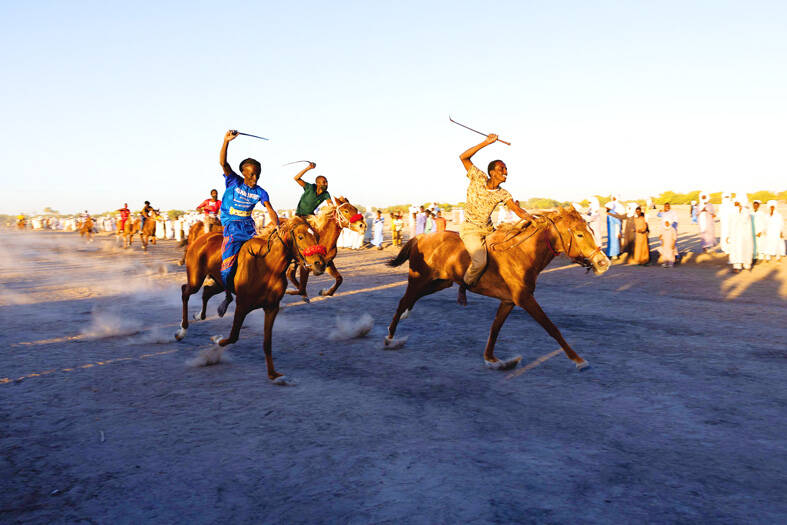
Photo: AFP
“Winning a race in Chad is like winning the Champions League,” racehorse breeder and owner Amir Adoudou Artine said, puffing on a small cigar, referring to the annual UEFA soccer competition of top-division European clubs.
Less well-heeled racegoers climbed trees or sat on the roofs of 4x4 pickup trucks to get a good view of the Biligoni racecourse, in a town midway between the bush and the desert in the southwest of the Barh el Gazel region.
Horse racing in Chad evolved decades ago from links with its former colonial ruler France, which has suffered a series of setbacks in the turbulent Sahel recently as Chad and others have ended military cooperation with Paris.
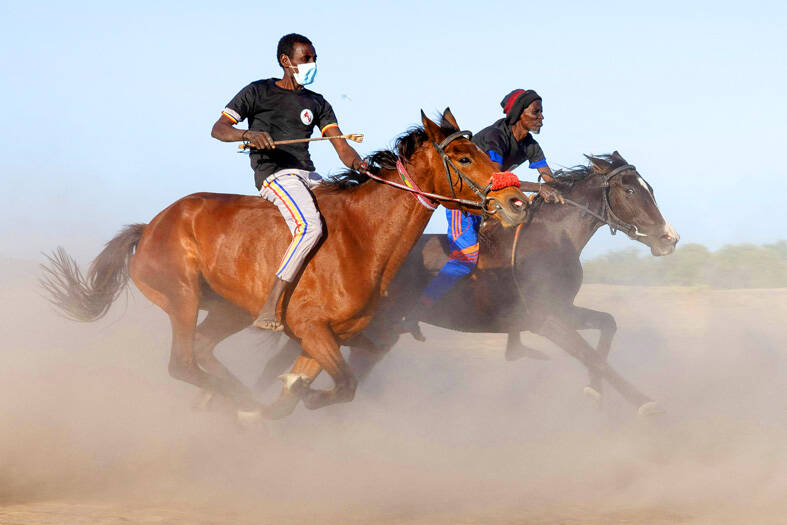
Photo: AFP
This year’s location was chosen as it is the home of Idriss Ahmed Idriss, a racehorse owner who is head of an association promoting improvements in horse breeding in Chad. He is also head of the Bank of Central African States.
Ahmed Idriss said he breeds his animals “the traditional way,” placing each mare and her foal with a cattle breeder who feed them whey and cereals, mainly millet. But such traditions could be in danger — not least because younger generations are less interested, owners grumble.
Come nightfall, everyone gathered around a campfire and discussed their predictions for the next day’s racing over endless cups of hot tea.
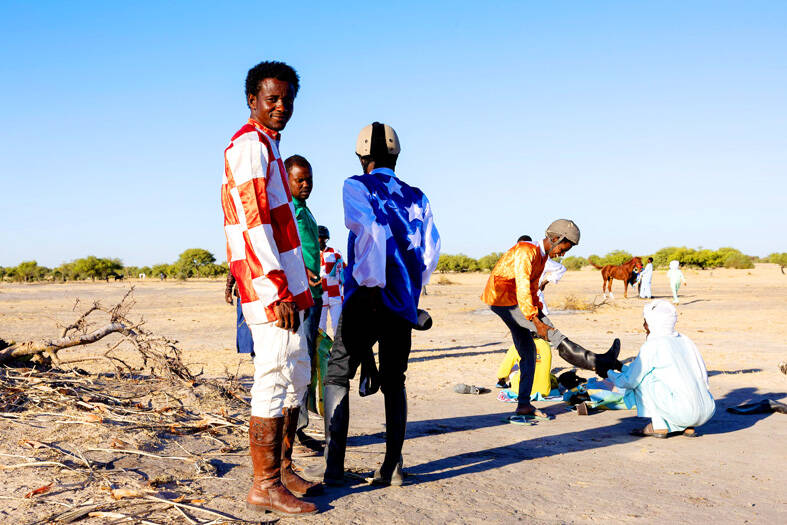
Photo: AFP
Sudanese tunes and French classics from the 1980s played in the background, and mutton boiled with spices, onions and tomato puree was served up from dawn until dusk. Betting plays no part in the traditional race meetings. The race season started in late November.
Horse racing in Chad has a “tormented history in this region,” Ahmed Idriss said, talking about its cattle rustling past.
“Good horses were needed to steal the cattle or run away,” added the 50-year-old, whose nickname “Cowboy Idriss” was coined in his teens when he bought his first horse at the age of 15.
His face lit up as he recalled seeing as a child “great horse parades during national holidays” and shows displaying historic horsemanship from North Africa.
Adoudou Artine, who is about to turn 55, also fondly reminisced that the races were “a place where you could discover modern life.”
Horse racing began in Chad at the end of the 1960s, initially with horses imported from France to be cross bred with local ones. The preference has since shifted to Sudanese breeds, but rainfall, horse flu and successive conflicts and clashes have weighed heavily on the popular pastime.
Younger people “prefer to play football, play cards, travel or buy cars,” lamented another owner in his 50s.
A sense of doom has grown that racing enthusiasts in Chad are a dying breed.
“Every time an owner dies or leaves, there is no replacement,” Adoudou Artine said, sitting by the fire.
Steep costs are also a hurdle, with a horse carrying a price tag of 1 million to 10 million CFA francs (US$1,601 to US$16,011). Then there is the food, upkeep and staffing to pay for.
“There are about 40 of us in N’Djamena and there were about twice as many 15 years ago,” Adoudou Artine said. “We are the last of the Mohicans.”

Fenerbahce on Thursday earned a rare 2-1 win in England, but were still knocked out of the UEFA Europa League by Nottingham Forest in the playoffs. Forest entered the second leg with a healthy 3-0 lead from the opener in Istanbul — where Vitor Pereira made an impact in his first game in charge — and that proved enough to advance to the round-of-16 with a 4-2 aggregate score. The result was a boost for Forest, struggling at 17th place in the Premier League, in their return to Europe after three decades. They next face Real Betis Balompie or Kerem Akturkoglu gave Fenerbahce

Soccer officials yesterday offered “full support and assistance” to the Iranian team in Australia for the AFC Women’s Asian Cup after the US and Israel launched massive attacks on their homeland. Iran’s 26-strong squad arrived on the Gold Coast days before the strikes on Saturday killed supreme leader Ayatollah Ali Khamenei, as Washington and Tel Aviv seek to topple the Islamic republic. They are due to open their tournament today against South Korea. The AFC in a statement said it “continues to closely monitor the recent developments in the Middle East during this challenging period.” “The AFC’s foremost priority remains the welfare, safety and
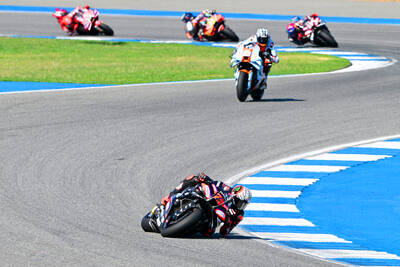
ROAD RASH: Marc Marquez retired after a crash, marking the first time after 88 consecutive races stretching back to 2021 that a Ducati bike failed to make the podium Marco Bezzecchi yesterday won the MotoGP season-opening grand prix in Thailand from pole position as defending world champion Marc Marquez retired late with a buckled wheel. Aprilia’s Bezzecchi led from start to finish to top the podium in Buriram, with KTM’s Pedro Acosta second and Trackhouse’s Raul Fernandez third. Ducati’s Marquez is chasing a record-equaling eighth world title this season, but he exited the race in dramatic fashion while in fourth place with five laps to go. The Spaniard, who started from second on the grid, took a corner wide, with the jolt to his bike dislodging the rear tire, badly damaging his
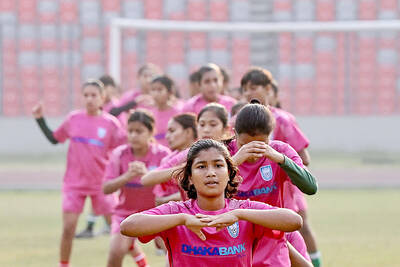
EVERY DAY A VICTORY: Players on the women’s team faced pressure from society just getting out onto the field as they prepare for their first Women’s Asian Cup game today Bangladesh’s national soccer team face daunting odds at their first-ever Women’s Asian Cup, but have already scored a major victory by qualifying. In the South Asian nation of 170 million, social stigma, family expectations, poverty and religious hardliners have long relegated women and girls to sports sidelines. The first women’s soccer league matches took place in 2011 and the squad, known to fans as the Red and Green, have kept pressing forward despite deeply embedded prejudices. “Many more girls would have joined us if the community had been even slightly supportive,” captain Afeida Khandaker told AFP ahead of her side’s March 3